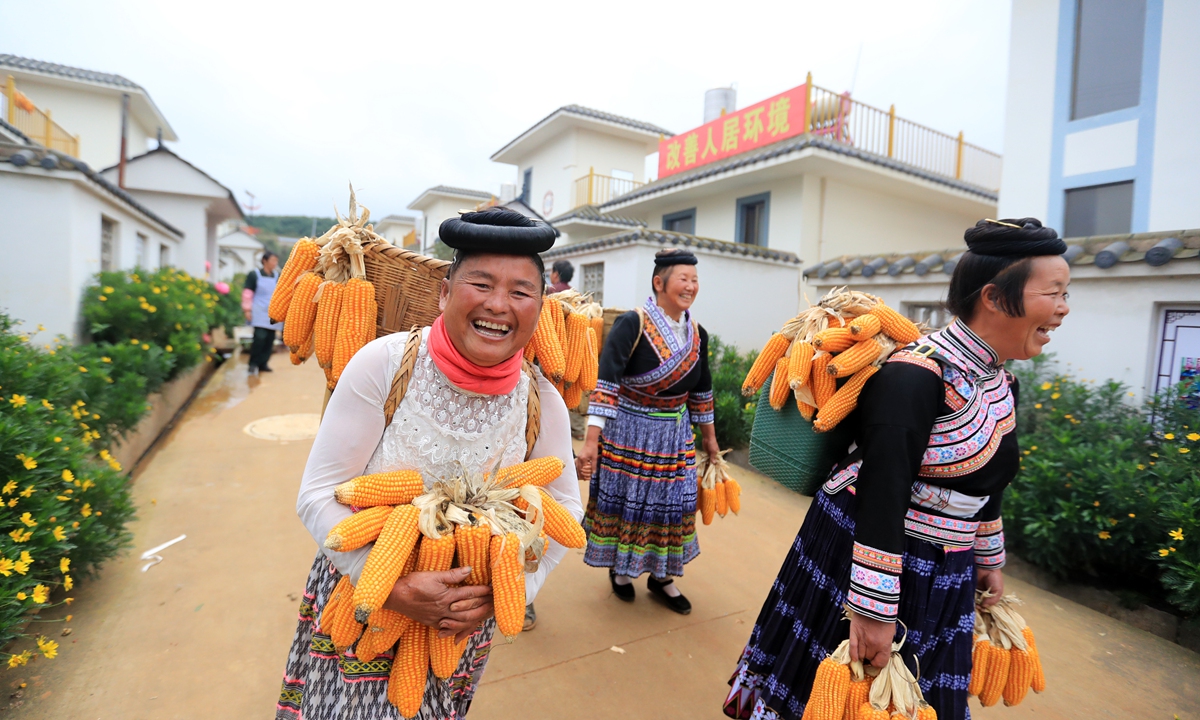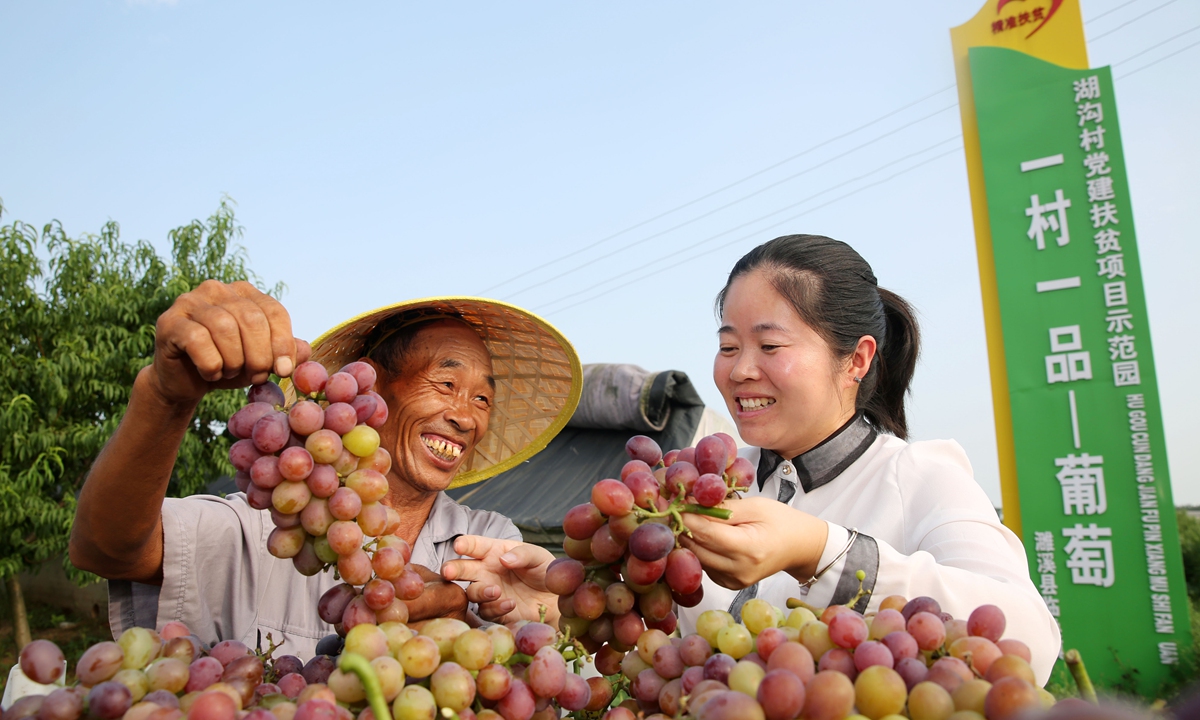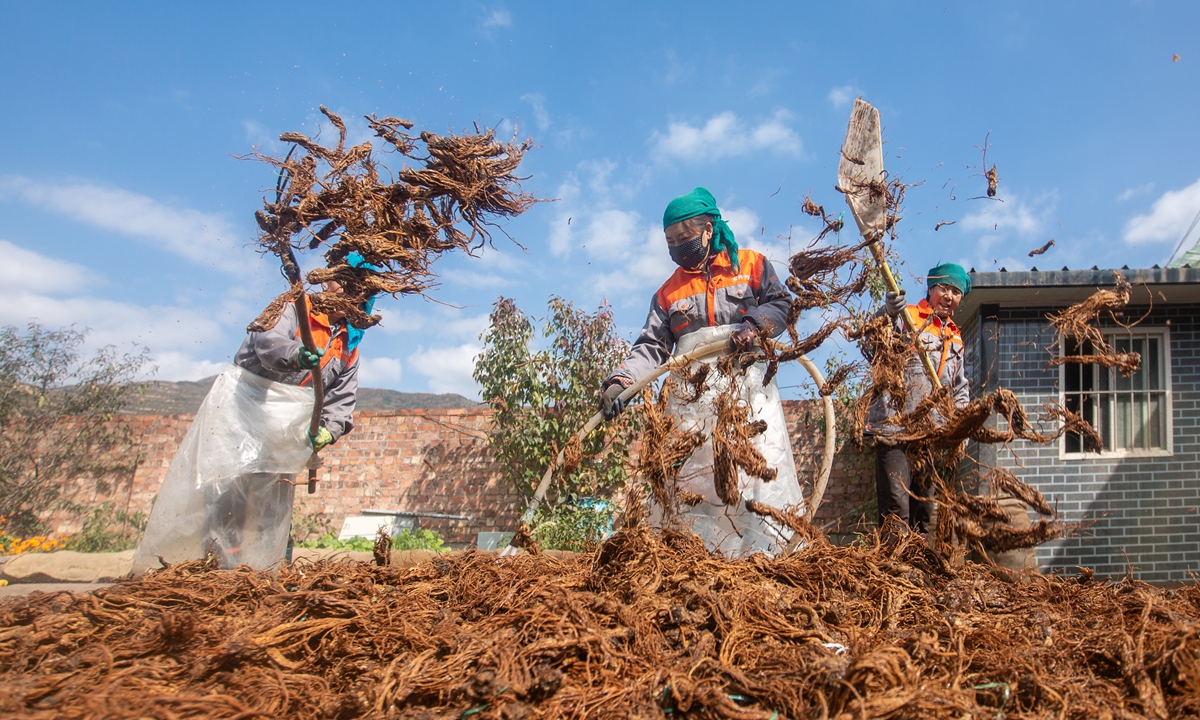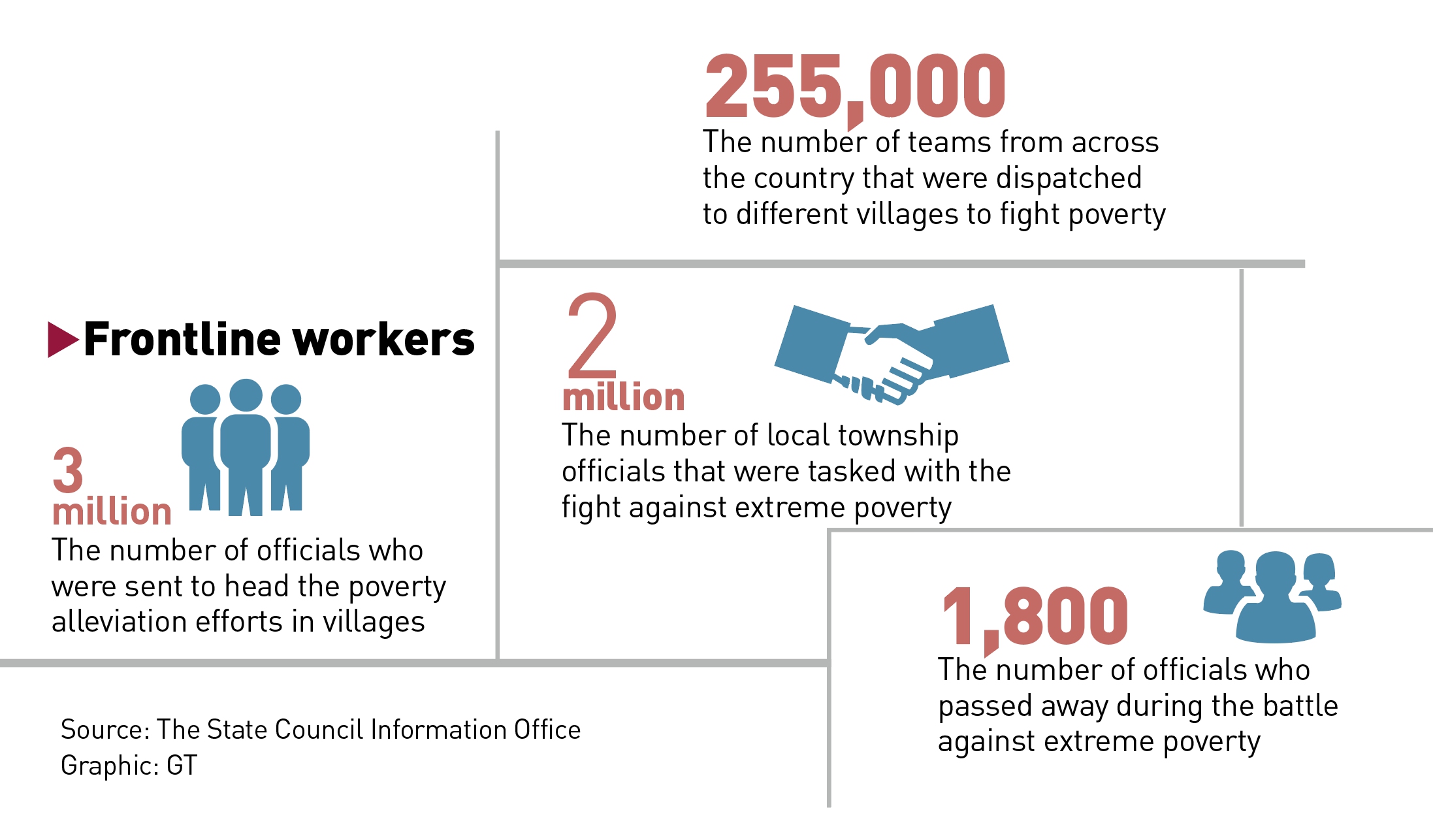How China achieves, sustains victory in fight against extreme poverty, toward common prosperity under CPC

Photo: VCG
Editor's Note:
On July 1, China declared that it has reached its first centenary development goal - building a moderately prosperous society, or xiaokang, in all respects and is marching in confident strides toward the second centennial goal of building the nation into a great modern socialist country. To decipher what that means in the context of where China is now and where it's heading, the Global Times is publishing a series of multimedia products about the achievements under the xiaokang goal in various aspects. This piece focuses on how the Communist Party of China [CPC] led the entire Chinese nation to a victory in the battle against extreme poverty, how it strives to sustain such a hard-fought achievement, and where it's headed next.
When Zhou Shaofeng arrived in the remote village of Xuntou in Shaoyang, Central China's Hunan Province, in March 2018 to become a frontline worker in the country's battle against extreme poverty, there were no paved roads, housing was deplorable, and much of the local population was living under extreme poverty. As Zhou and others discussed a bold three-year plan for the village to eliminate extreme poverty, many were in doubt and some even sung songs to tease him.
Three years later, when Zhou was leaving the village to return to his "real job" at a research institute under Aero Engine Corporation of China, a state-owned aircraft engine manufacturer, paved roads had been built throughout the village and the entire village had been lifted out of extreme poverty. Locals held a grand ceremony to send his team off to express their gratitude and sung songs about the great policies of the CPC.
Zhou is one of over 3 million officials from across the country who went to the frontlines in the country's battle to eradicate extreme poverty. Xuntou is one of the 128,000 villages across China that successfully eliminated extreme poverty. And the 400 people or so in the village are just a small fraction of the 98.99 million rural residents who were lifted out of extreme poverty.
After decades of relentless efforts by the CPC, the entire Chinese society, as well as frontline workers like Zhou, China, in February, declared "complete victory" in the fight against extreme poverty.
Addressing a grand gathering in Beijing to mark the milestone on February 25, Xi Jinping, general secretary of the CPC Central Committee, described the country's achievement in eradicating extreme poverty as a "human miracle" that shall "go down in history."
The achievement is truly a miracle in all respects. For the Chinese nation, it means the problem of extreme poverty that had endured for thousands of years has been addressed. For the world, it means one-fifth of humanity has been lifted out of extreme poverty. Throughout human history, no other country has ever lifted as many people out of extreme poverty within such a short period of time. In total, China lifted nearly 100 million people out of extreme poverty, which is nearly one-third of the US population. Over the past eight years, China lifted approximately 10 million people - roughly the size of the entire population of Sweden - out of extreme poverty each year.
There is no denying the significance of China's success in eradicating extreme poverty, but there also remain a series of questions. How was China able to achieve what no other country could? How will China prevent those populations from falling back into poverty? Is China's solution to ending extreme poverty replicable in other countries and regions? After eliminating extreme poverty, what's the next goal for China?
There are countless analyses and answers to those questions, but not many can fully illustrate the deciding factors behind China's success: The stories of millions of frontline workers like Zhou. Known as "first secretaries" of village CPC committees or "officials stationed in villages," their mere existence, sense of mission, professionalism, and sacrifice are the personification of China's institutional advantage under the CPC's leadership, precision of the CPC's policymaking and execution, and profound unity, collectivism, and capabilities of the Chinese society to tackle major issues - all crucial ingredients for the success.

Photo: VCG
From the frontline to victory
"I always think of myself as a brick. Wherever the Party needs me, that's where I will do my part," Zhou told the Global Times in a recent interview. "As a member of the CPC, the decision by the Party to select me to join the battle against poverty is placing trust in me."
The job is an honor for millions of frontline workers like Zhou, but it is also arguably the toughest job many of them will ever have to undertake in their lives.
For Zhou, after seven hours of travel on poor roads, what awaited him in Xuntou was a scene he had never imagined: All roads were dirt ones; many houses were in grave conditions without windows or doors; and power shortages were frequent. Above all, 102 households and about 400 people living in extreme poverty were waiting for his help.
"After arriving in Xuntou, one of the poorest villages in the country, I deeply felt the biggest, most difficult hurdle was the contradiction between Xuntou's backward situation and the task of achieving xiaokang among all people," Zhou said.
Eliminating extreme poverty is not only a crucial founding mission of the CPC but is also a crucial part of the Party's first centennial goal of achieving xiaokang, or moderately prosperity in all respects, which contains a sweeping set of goals from poverty reduction to economic growth, and environmental protection.
Months after declaring victory in the fight against extreme poverty, at the centenary celebration of the CPC on July 1, Xi declared completion of the country's first centenary goal. "This means that we have brought about a historic resolution to the problem of absolute poverty in China," Xi said.
To reach that goal, Zhou rolled up his sleeves and went to work. He and his colleagues went door to door to get to know each household's conditions, draw targeted plans for each family, study and explore potential sources of income, and contact various departments and businesses to secure funding and deals.
"The team members almost had no time for rest and the pressure was massive," Zhou said, adding that he didn't have time to go to the hospital for hematuria treatment. Some colleagues missed the birth of their children and others couldn't take time off even after sustaining injuries while on the job.
Despite the challenges, risks, and dangers, Zhou and his team had addressed one issue after another, including water supply, roads, electricity, broadband and housing.
It was seemingly "mission impossible," but there was also great help - from all levels of government and the society. "Throughout the process, I deeply felt the resolve of our country in the poverty alleviation work," Zhou said, noting that every issue related to poverty alleviation would be swiftly addressed by government agencies, no household or individual would be left out, and the requirements and reviews were very strict.
"This can only be achieved under China's national system of socialism with Chinese characteristics where no one can be left behind and collective strength can be concentrated on major tasks. No capitalist country can achieve this because capitalist countries only serve a particular group of people," Wang Yiwei, director of the institute of international affairs at Renmin University of China in Beijing, told the Global Times, noting the participation in the fight by all levels of government and all corners of the society.
Since 2012, special funds for poverty alleviation efforts from all levels of governments reached 1.6 trillion yuan with 660.1 billion yuan from the central government. Targeted loans reached 9.2 trillion yuan and other financing programs also totaled trillions of yuan. Additionally, financial assistance from the nine provinces and municipalities in East China reached 100.5 billion yuan, and investments made by companies in the east region reached over a trillion yuan.
It is with such great support, poverty-stricken villages across the country like Xuntou were able to get rid of extreme poverty. In 2019, after what Zhou called "the strictest review in history," Xuntou was officially declared a village without extreme poverty.
Zhou's story is shared by not only the over 3 million workers sent to the frontline from across the country, but also nearly 2 million officials at townships and millions more officials in villages.
Shen Xiang, who worked at the local poverty alleviation office in Xide county, Liangshan Yi Autonomous Prefecture in Southwest China's Sichuan Province, one of the poorest places in China, also recalls the toughest days in his work on the frontline.
But rather than dwelling on the endless paper works and with countless nights spent on the job, Shen is keen to express his great pride in having the opportunity in participating in such a massive, unprecedented mission to end extreme poverty.
"There was no room for rest and I worked about 16 hours each day, but it was very fulfilling and satisfying," Shen told the Global Times, "there were many other officials who lived up to the task of lifting the people out of poverty, some even gave their lives and didn't get to see the day of victory."
In the fight against extreme poverty, more than 1,800 Party members and officials lost their lives on the job and fulfilled the vow to sacrifice everything for the people with their actions, reads a white paper on China's poverty alleviation work released by the State Council Information Office in April.

Photo: VCG
Confidence to sustain victory
Safeguarding such a hard-fought victory and further building on the achievement to reach higher goals has become the new top priority for the country. During the speech in February, Xi stressed the need to further consolidate the achievements, invoking an ancient Chinese proverb that means claiming victory is not the hardest thing but maintaining the victory is.
While there are certain concerns that some households may fall back into extreme poverty, there is also great confidence among the frontline officials who lifted them out of extreme poverty in the first place.
"I worry about the return of extreme poverty, but I have confidence," Zhou said, adding that to address the root cause of poverty, people's hope for a better life must be "lit up." With an improved local Party cell and its significant roles, residents in Xuntou now have a "backbone" and great aspiration for the future.
"Generally speaking, China's poverty reduction work is irreversible because China's poverty alleviation starts with the mind. While initially being lifted out of poverty, people now have self-motivation [to stay out of poverty]… And with local industries set up, what's left is self-development," Wang said.
Zhou also said that sustainable development of local industries fostered during the fight against extreme poverty will ensure steady income for residents. For example, Xuntou has four major produces, including tea, pears, and sweet potatoes, which have many sales channels.
"Going forward, we will help Xuntou village promote online sales," he said, noting that he had communicated with his successor at the village and relevant work is already moving forward.
Such continued support for rural residents is also provided nationwide. The country has also set up a five-year transition period with stable poverty alleviation policies and various other measures to prevent mass populations from falling back into extreme poverty.
In Liangshan, Shen said that a monitoring mechanism, contingency plans and various other measures have already been put in place to prevent large-scale return of extreme poverty.
"Though extreme poverty has been eliminated, policies, regulations, and responsibilities on officials will continue," he said, noting that with the continued support, results of the fight against extreme poverty will be consolidated and the new mission for rural vitalization will begin.

Photo: VCG
Transition to higher mission
After the completion of the fight against extreme poverty, China, early this year, launched the sweeping rural vitalization strategy to further bolster development in the country's vast rural areas. Under the plan, policy supports, including massive funding, will further increase, while various development plans will also be carried out, given the significance of the strategy in China's long-term goal of building a modern socialist power, analysts said.
"If poverty alleviation is about households and individuals, then rural vitalization and common prosperity will be the development of the entire country and entire industries," Wang said.
Parallel with the rural vitalization strategy is the mission to achieve common prosperity as part of the country's second centennial goal, which goes well beyond simply fighting poverty but actually lifts the Chinese people to more prosperous and happier lives.
After declaring the completion of the first centennial goal of building a moderately prosperous society in all respects at the CPC centenary celebration on July 1, Xi announced that "we are now marching in confident strides toward the second centenary goal of building China into a great modern socialist country in all respects."
Following the announcement, there has already been a raft of development plans and policy directives issued. At a meeting of the Central Committee for Financial and Economic Affairs on Tuesday, Xi called for adherence to the people-centered development philosophy and promoting common prosperity while pursuing high-quality development.
Just like the seemingly insurmountable challenges during the fight against extreme poverty, such a greater goal, which is also unprecedented in human history, might also seem like "mission impossible."
But just like how China created a miracle in eradicating extreme poverty, China - with the CPC's firm leadership, the people's unity and collective strength as well as the tireless work of millions of selfless and professional officials like Zhou and Shen - is poised to make more miracles in the decades to come, analysts said.
"There is no end to poverty eradication and reduction. There is only constant improvement. That is precisely why China now shifts to the pursuit of rural vitalization and common prosperity," Wang said.

Graphic: GT


